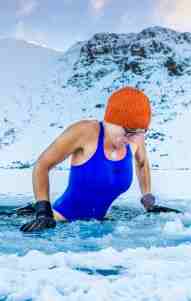Cold Water Swimming
Gilly McArthur grew up in northeastern Scotland and was already swimming in the lakes – or lochs as they are known in the country – when a child. Today she is a cold-water coach and helps newcomers who are seeking to experience the sport she loves: swimming in ice-cold water.
What requirements should you bring with you if you want to give it a try? Does it take courage? Or would you rather have a good wetsuit?
The secret to coldwater immersion is to go at your own pace! Some people prefer to swim in a wetsuit, wrapped in neopreen, while other people prefer to just wear a swimming costume. It really is up to you! It’s just about showing up and giving it a go and understanding that every day will be different and your body on the shoreline that morning would be different to your body the day before.
Speaking from my own experiences I prefer to just wear a swimming costume. I like to feel the water and the coldness on my body to feel truly connected to nature. When I’m coaching swimmers who wear wet suits I suggest that for the last minute or so of the session they just slip their wetsuit off in the water, to see how that feels for them. Perhaps in winter I will wear some protective boots to keep my toes warm and protect them from the rocks. Boots and gloves don’t blunt the benefit of the cold but do make it more comfortable!
Over time your body will adapt, you only need about six sessions to retrain your brain. It always feels hard for me – you just get used to knowing that it will feel hard and then it’s okay.
What happens to your body when you get into cold water, especially to the brain?
There are so many things that happen when we get into cold water! Blood circulation improves (the cold water causes blood vessels to constrict, and when you emerge from the cold, they dilate rapidly), mood brightens due to the release of endorphines and mental well-being is increased. And for those unfamiliar with meditation cold-water swimming is a great entry point, because in cold water there is no bandwidth to think about shopping lists and work. We can only be fully present in the sensations and sounds that are happening in your body. And this can really help calm us down. Furthermore, exposure to cold temperatures is thought to help improve the body’s response to stress by activating the sympathetic nervous system and triggering the release of stress hormones like adrenaline and cortisol. Also, recent studies have shown that cold water immersion may have a positive effect to reduce the onset of Type 2 diabetes and even dementia. It’s great that science is catching up with what’s been know about for millennia at least anecdotally: Hippocrates talked about the benefits of cold water in 400 BCE so this is not new at all.
What is the best way to get used to the cold?
Everybody has a different place to start off at. And for most people in winter there’s not much swimming actually going on, it’s more just chatting in water, bobbing up and down for a few moments. Some prefer to start with cold showers, simply turning your shower a little bit colder and ending on cold is a great way to build tolerance. I myself still find cold showers quite hard! It gets easier when you start spraying your feet first, working the showerhead up your torso. But I have an ice tub in my garden I use if I can’t get to the lake and a big work day ahead. I plop into it while the kettle is boiling to get my cold dip before breakfast and coffee. There is science to say that you only need about two minutes of cold water to help to rewire your brain and to start the flow of happy hormones.


Does it still feel uncomfortable when you’re used to it?
Yes, even though I’ve been swimming now for many winters, it always feels slightly uncomfortable. But that is why it’s so powerful! When we are doing things that are uncomfortable we learn to overcome. At first it seems hard. And once you’ve got your shoulders in, and your breath under control it’s just magic!
What should everyone know about wildswimming?
That’s a great question – it can become a life changer, professionally or as a fun activity with a group! It’s incredibly powerful for helping with anxiety, depression and supporting your immune system. There is something deeply powerful about being in nature with a great community getting cold, I know that sounds crazy, but it’s true! It’s important to take it really steady in your first season of winter swimming, starting in the summer and then catching the degrees as they drop so your body gets used to the changes. Within that remember that your body will cool for at least another 20 minutes after you get out. So you must get out of the water before you feel cold. Never jump in, always have lots of layers to put on after you get out and a warm drink. And lastly, if you have any heart conditions or anything you are slightly unsure about, it’s best to speak to medical professional before you give it a go.




